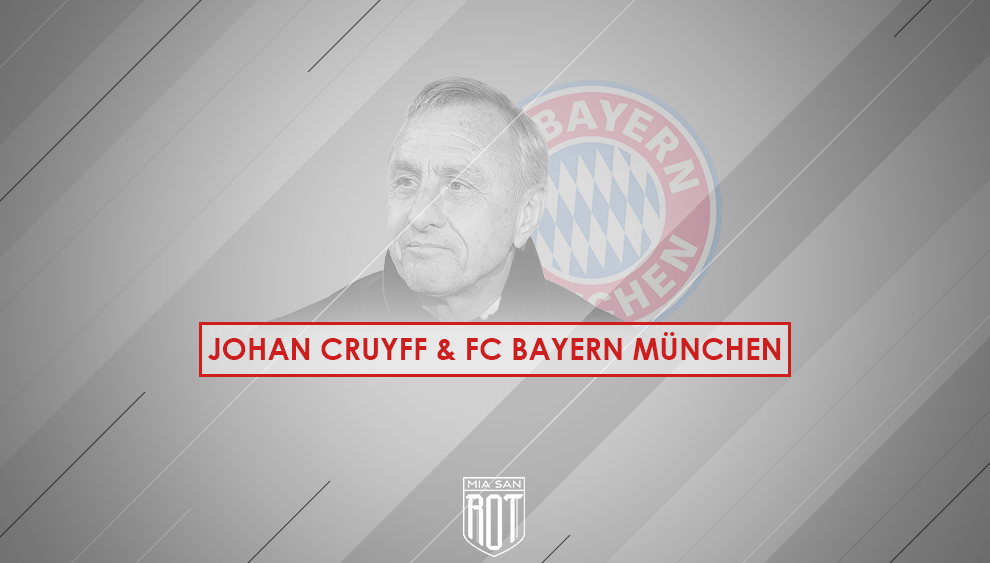Johan Cruyff & FC Bayern München
NOTE: This article was written by Eskender Tamrat. Some of his other work can be found at the Bundesliga Fanatic and of course you can follow him on Twitter.
Football fans from all corners of the world wished to witness Camp Nou’s celebration nearly a year ago when Barca entertained their fierce rivals Real Madrid. It was the visitors who come back from a goal down to take all the points – in a game which kicked-off a wobbling April for Barca, which saw their comfortable league lead jeopardized beside a Champions League quarter-final defeat by the hands of Atlético Madrid.
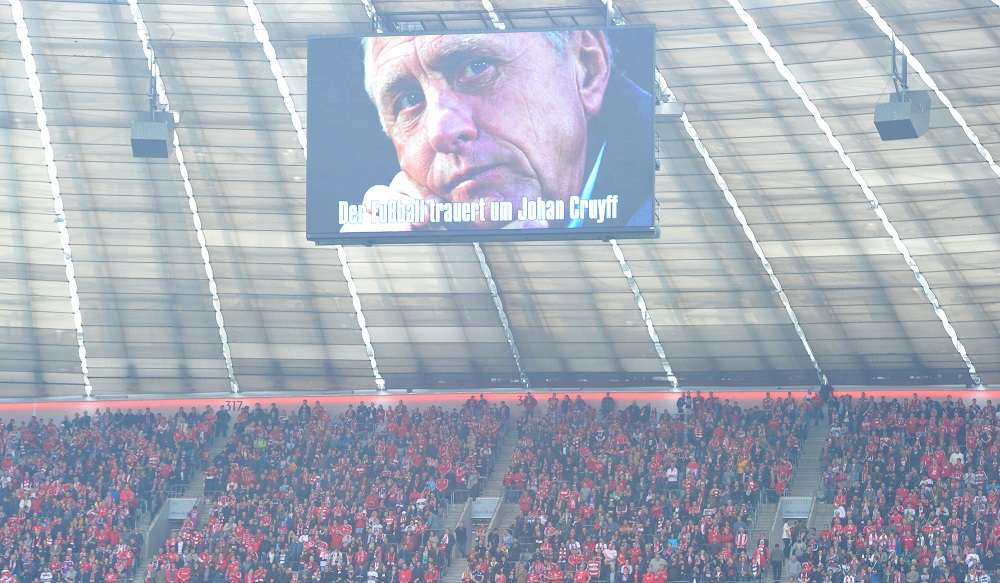
(Photo: Lennart Preiss/Bongarts/Getty Images)
But it was not the celebration of a mere goal that was the highlight of the night. Instead it was the celebration of the life and legacy of the club’s greatest icon. In addition to successful eras as player and manager at Blaugrana, Cruyff was influential in Frank Rijkaard and Pep Guardiola’s managerial hirings in 2003 and 2008, respectively, as unofficial advisor before briefly served as Barcelona’s honorary president. The El Clásico was Barcelona’s first fixture since Cruyff’s sudden death a little over a week earlier. In the same vein as the friendly match between the Netherlands and France went, which held the day after his death, special tributes ensued, ranging from a mosaic by the 90,000 Camp Nou fans to an alteration on the club’s badge to commemorate the occasion.
Pinnacle of total football
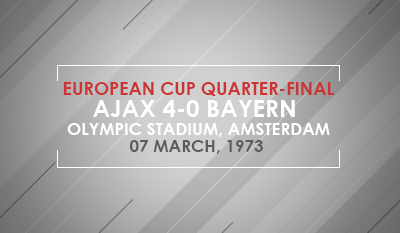
However, it was at Ajax, the club he first joined at the age of 10, Cruyff first made a name for himself. He was the undisputed star of the lot when they became the first team to win the European Cup (today’s Champions League) three times in a row (1971 – 1973) since Real Madrid’s early dominance. On a more personal note, two of his three Ballon d’Or accolades (1971, 1973, 1974) indebted for his central role in Ajax’s total football.
Cruyff left Ajax to join his former mentor Rinus Michels at Barcelona in 1973 shortly after the Dutch side secured their third European Cup title with a win against Juventus. But it was the first-leg of the quarterfinals, against the emerging team from West Germany, that leaves longer in memory. In only their second go at European Cup – they blew a two-goal lead from the first-leg in Saint-Étienne in their first tie of the competition in 1969-70 season – Bayern were confident to spur a surprise result.
Although the key protagonist of the blossoming ‘total football’ principle, Michels, left after landing the club’s first European Cup triumph, Ajax stayed true to their core value under the Romanian manager Ștefan Kovács. They were still the underwhelming favorites ahead of the tie against Udo Lattek’s Bayern Munich, who scored 20 goals against Galatasaray and Cyprus’ AC Omonia in the previous rounds.
Bayern went toe-to-toe for an half an hour against the two-time European champions in the first-leg at Amsterdam. The home side saw plenty of the ball, but Bayern responded with solid defensive stability and dangerous counterattacking moves. But it didn’t stay that way for any longer. The game’s first clear chance went for Piet Keizer, whose selection as the club captain by the players served as the final straw for Cruyff’s Ajax first stint. From a close range, Keizer failed to keep his header on target after a goalmouth scramble.
Soon Bayern lose their composure and, in particular, Sepp Meier’s nightmare started with his first howler when he misinterpret a harmless cross and Franz Roth had to save his blushes with a goal-line clearance. Roth, who rather known for his urge of scoring crucial goals, was busy kicking Cruyff throughout the match. However, when the halftime whistle went, Bayern and Maier were in a better position. First Maier made a great save to deny Wim Suurbier before, to an unmarked Gerd Müller’s exasperation, Willi Hoffmann squandered the last chance of the half at the other end after a customary Franz Beckenbauer chip created an opening.
The breakthrough arrived seven minutes after the interval. Maier couldn’t get hold of Heinz Schilcher’s moderate shot and Arie Haan was on hand to poke the rebound home. The next minute, his opposite number, Heinz Stuy, also spilled the ball from Hoffmann’s attempt, but there was no one around to finish the job. In contrast to the decent first-half, where even the usually restrained Hans-Georg Schwarzenbeck was seen at Ajax’s half, Bayern were happy to soak up the pressure.
Shortly after a penalty appeal by Cruyff waved on, Gerrie Mühren scored a stunning volley which was so unexpected that the camera crew missed a clear view of the goal. A minute later, Maier rushed out to punch clear Cruyff’s corner-kick and completely missed the ball, as Haan scored his second goal of the night with a simple header. Cruyff completed the rout with the 90th minute goal, just like the 1968-69 round of 32 win against 1. FC Nürnberg, with a glancing header from Ruud Krol’s cross.
The not-so-friendly friendly
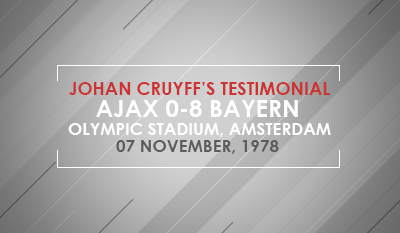
Ajax would left to rue for the missed chances considering the dominant second-half display. It’s not because of the second-leg outcome, however – Bayern could only conjure a 2-1 win at home in the return fixture. When Cruyff surprised many by announcing his retirement in 1978, Bayern were the opponent for the game Ajax staged for his testimonial. Decades after the peculiar farewell game, Cruyff called the soaring experience “a car crash” in his autobiography entitled, of course, “My Turn”.
Before the kick-off, it was hard to spot ill-will, as Maier gave an elegant hunting hat to Cruyff as a present. But the ever-present goalkeeper, whose previous ordeal at Amsterdam earned him the nickname ‘Die Katze von Anzing’, was in no mood of playing by the book like the rest of his teammates. Ajax earned the first corner of the night but when it come to no avail, Müller opened the scoring with a first-time volley as Maier credited for the assist with a long punt.
But like Ajax’s win five years ago, one had to wait for the second half for all hell to break loose. Cruyff had his chances to get his name on the scoresheet before the break – narrowly miss the target from an equally impressive volley and a daring curling shot from a tight angle. It was an open affair – the sort of which you expect from exhibition games – with end-to-end football.
Three minutes before the break, Karl-Heinz Rummenigge doubled Bayern’s advantage after a beautiful chip from Paul Breitner, who is now the architect of the team on his second spell at the club instead of winging his iconic afro from the left flank. Although some of the key players from the 1973 fixture – and the earlier 5-0 friendly defeat at Munich – were still in the team, the likes of Beckenbauer and Hoeneß already saw the exit door from the club.
Bayern – who repeated Ajax’s three consecutive European Cup feat immediately (1974 – 1976) – simply showed their coming of age with a ruthless second-half showing. And fortune favors the bold, of course. When Breitner’s pass appeared too heavy for Müller, Piet Schrijvers’ clearance gave a second chance for the midfielder to score the third goal of the night himself.
One could mistaken Bayern were the club most known for its possession-based football on the night, as evidenced by the fourth goal. Rummenigge provided the finishing touch after a sequence of silk moves from the visitors, including a back-heel from a certain Martin Jol, who only made a handful of appearances for Bayern. An equally pleasing one-two between Müller and Breitner ended up with the second goal for the latter before the hour mark.
Ajax fans treated for their best ten minutes of the night following the 5-0. They cheered Maier’s failed attempt of preventing a corner-kick before the (supposedly) man of the hour nearly salvaged a stylish consolation. His attempt from outside the box was identical to Ronaldinho’s famous goal at Chelsea’s Stamford Bridge which took place almost three decades later. Unfortunately, the effort went wide, and the show was over for the home fans – whose hostile reception in addition to the already bad accommodations by Ajax also considered as the reasons for Bayern’s merciless showing – before it began.
In the 68th minute, Schwarzenbeck’s full force interception suddenly turned to an assist, as Der Bomber made a light work of beating Schrijvers in goal. Surprisingly Müller was not yet satisfied – perhaps in an attempt to let it be known that he was angry by Cruyff’s decision to escape the second-leg in Munich in 1973. He threw the ball to the linesman’s direction after an offside call, much to the crowd’s displeasure, and then hit the side-netting from a close range. At this point, Schrijvers was let go of his misery to be replaced by Peter Jager.
The new custodian lived up to his exquisite name by stopping the first shot that came to his direction, but conceded the seventh goal of the night when Breitner completed his hat-trick. Two minutes later, before the media came up with the Breitnigge tag for the early 1980s’ deadliest attacking partnership, Breitner played Rummenigge through on goal in nearly a carbon copy of Bayern’s second goal to round off the rout with 15 minutes yet to play.
You would be forgiven to think Bayern cooled off for the remaining 15 minutes, but that was far from what happened in the pitch. With only four minutes left in the match, the referee blew his whistle for Cruyff’s proper send off, if there would be any in the night, leaving Bayern players in the cold while he gets retirement bumps by his Ajax teammates. When play resumes, and Cruyff treating himself with a cigarette in the dressing room, Rummenigge nearly made it nine, with his audacious shot blocked by the woodwork for the second time in the game.
Bayern apologized for ruining the event, but some never let go of their grudge in the wake of the uncalled spanking. Uli Hesse’s magnificent account of Bayern’s history – Bayern: Creating a Global Superclub – mentioned Cor Corster, Cruyff’s agent and father-in-law, blocked Rijkaard’s move to Bayern some years later as he also happened to represent the versatile player.
Last hurray in form of UEFA Cup
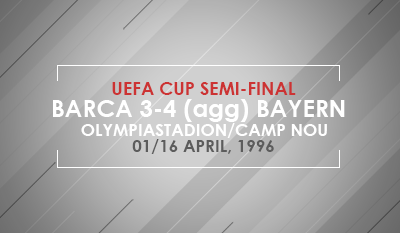
Fortunately, not only because of the undeserved testimonial but his top form on the night, Cruyff returned to football the following year after disastrous investments. He even returned to Ajax before doing the unthinkable and end his playing career, once and for all, at his beloved club’s fierce rivals, Feyenoord. He later returned to both Ajax and Barcelona – clubs he hold a larger-than-life status – as manager.
He came head-to-head with Bayern for the final time in the 1995-96 UEFA Cup (today’s Europa League) semi-final as Barcelona manager. Bayern played against Cruyff’s side in the first-leg at Olympiastadion in a scrappy, snowy affair – which didn’t keep Cruyff from toying with the fourth official on whether he crossed the dugout line to yield his instructions.
Òscar opened the score following a beautiful linkup play with skipper José Bakero, but substitute Marcel Witeczek and Mehmet Scholl turned the tie in a space of five second-half minutes. But the mercurial Gheorghe Hagi scored a goal his man-of-the-match performance deserved, albeit Markus Babbel’s suicidal backpass played a huge role in the process.
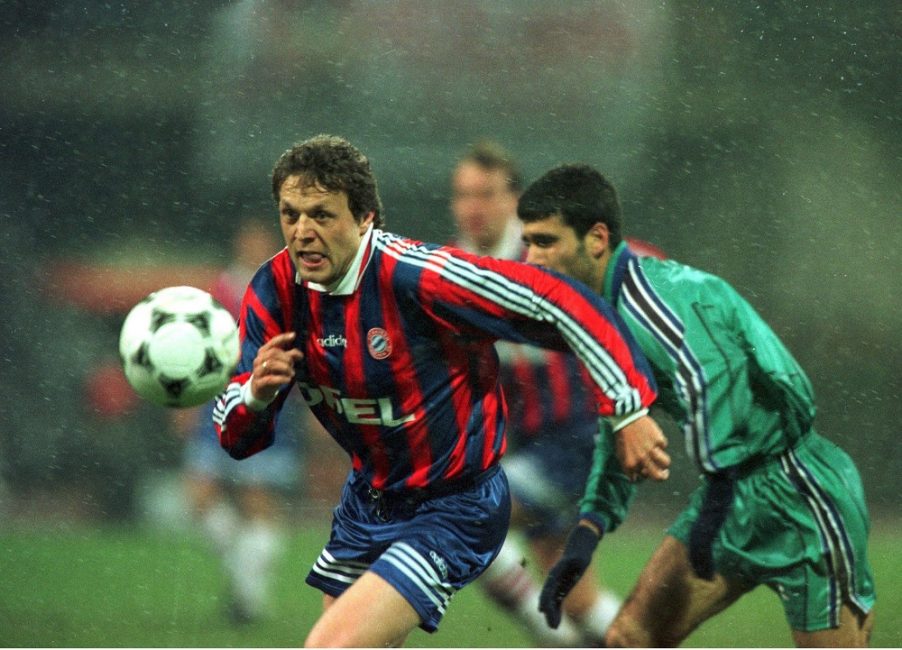
(Photo: Bongarts/Getty Images)
A goalless draw would have been enough to see Barca progress to the final, but Bayern prevailed at Camp Nou with Babbel making amends by scoring the opener five minutes from the break and School displaying one of his best performances in the Bayern jersey, which even earned him rumours about a potential move to Barcelona later. Bayern went on to win the competition with a two-legged triumph against Bordeaux. Cruyff’s relatively brief managerial career – 10 and a half years – produced two Cup Winners’ Cup and Barcelona’s first European Cup (1992) triumphs in European fronts.
In his enlightening autobiography, Cruyff repeatedly singled out Bayern for appreciation of the way the club runs. He endured difficult times at both Ajax and Barcelona to instill his ideas freely and believed there is a lot to be learned from the football juggernauts from Munich. As the renowned writer Gabriele Marcotti remarked in his excellent tribute to Cruyff, it is hard to find a man who exerted a greater influence on the game.



